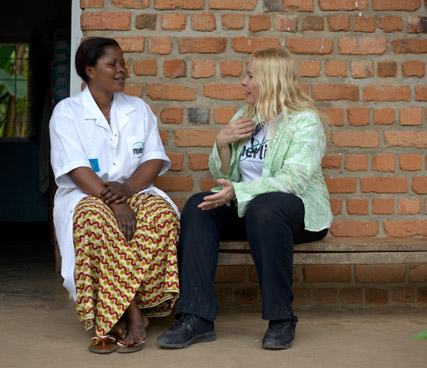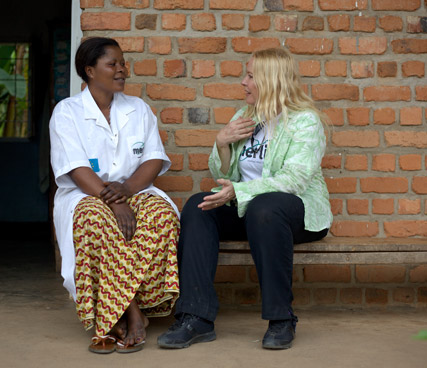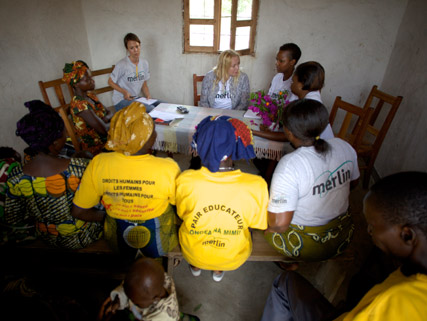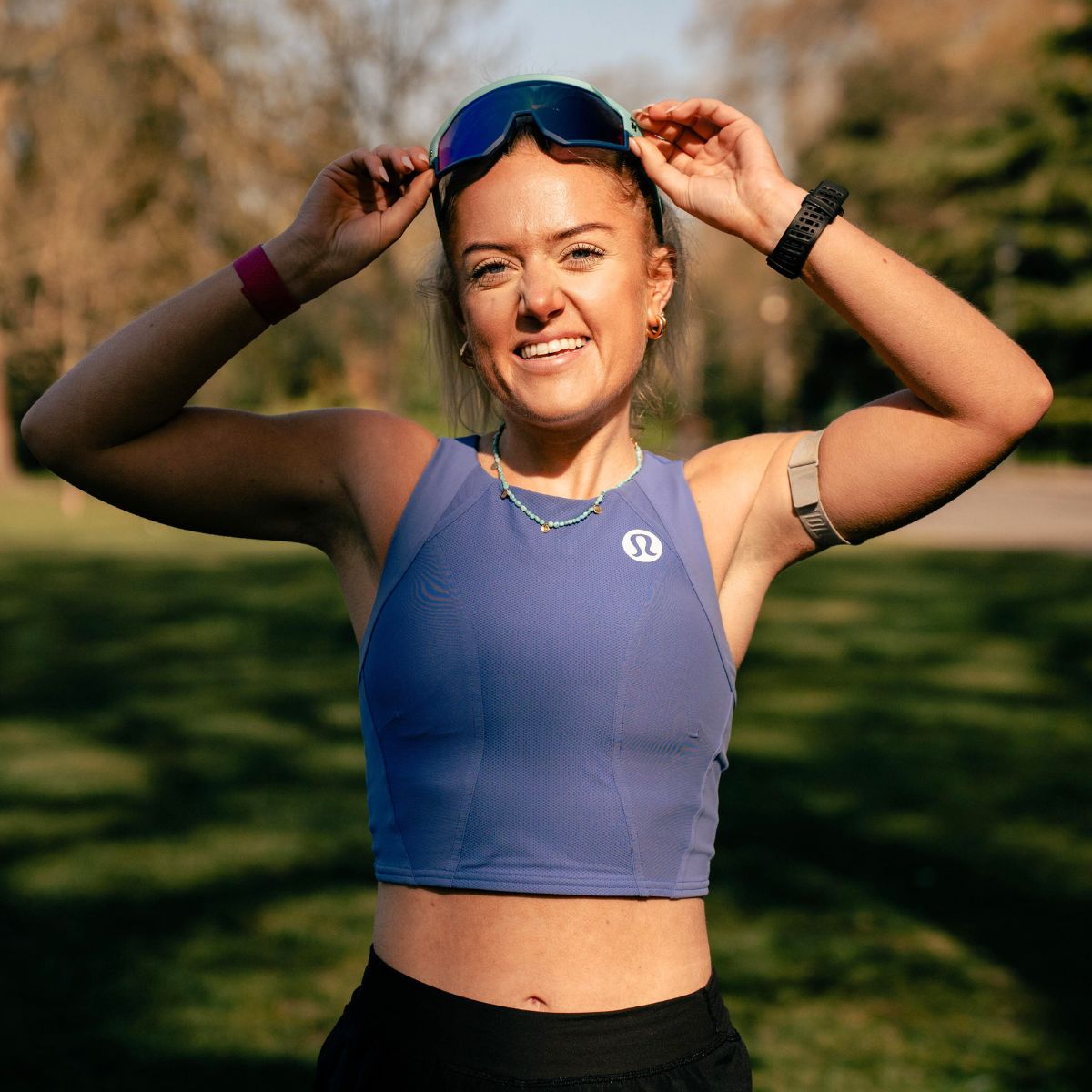Special report: Congo
Dr Pamela Connolly writes for marieclaire.co.uk about a recent, traumatising trip to Congo

Dr Pamela Connolly writes for marieclaire.co.uk about a recent, traumatising trip to Congo
'On my first visit to the dangerous heart of Africa I felt uncomfortably visible,' writes psychologist Dr Pamela Connolly. 'You don't want to be blonde in North Kivu, the conflict-affected corner of the Democratic Republic of Congo. But then, you don't want to be a woman either.'
In a special report for Marie Claire, Dr Connolly recounts a recent trip to North Kivu, in Congo, with medical aid agency Merlin, where she visited health facilities dealing with sexual and gender based violence (SGBV): talking with survivors, meeting local health workers trained by Merlin to treat survivors' physical injuries and speaking at length with women's groups who, despite the threat of reprisals, are fighting back by taking to the streets.
'Sexual violence against women here is ubiquitous, and the utterly terrible style of the rapes is hard to even contemplate,' she continues. 'Travelling around the countryside to remote Merlin-supported health clinics, I spoke with women on whom such atrocities had been perpetrated. They had barely survived. They sat stoically with clouded eyes, whispering details of being inhumanely surprised in their villages, homes, on the way to market and in the fields that they were trying to cultivate.
'One of the first I met was J. Her wounds were still fresh, her psychological pain profound and palpable. She told me that armed men came to her village to loot. There was little for them to plunder, which made them angry and vengeful. They decided to use grenades, and J was left badly wounded. She lay bleeding on the ground and watched as they burnt her house. Two days later the same men came back and raped her. 'Because of my injuries,' she said, almost apologetically, 'I could not run away.' Her husband abandoned her, which is a common scenario after women are raped. Apparently, having a violated woman is too shameful for any self-respecting man to put up with. J has four children, and now she doesn't know how she is going to take care of them. As with all women who are lucky enough to have access to a clinic, Merlin provided J with drugs to prevent infection, but she is still nervous about the results of her HIV test.
'In this colonially-desecrated, war-ravaged land, there are multiple dangers - malaria, yellow fever, malnutrition, or crossing the burst Rutshuru River with a heart-stopping ravine just inches from the wheels of your bus. And rape is used as a weapon. Foreign objects such as poles, guns and knives are forced into vaginas to cause terrible internal damage. Get it? If you feel emasculated because you were on the losing side in your latest skirmish, you might as well try to prevent the birth of another potential enemy. Oh, and mutilation is more effective than killing, since women who lose their reproductive ability become a burden on the community.
'But this is only half the story. As horrific as the rapes are, there's also an extraordinary humanity at work that has so far never been given voice. The utterly remarkable men and women I met humbled me - the brave, Merlin-trained health workers who man the rural clinics. They are on the front line every day - threatened, robbed, even raped themselves. Many have not been paid by the Government in years, yet still they turn up to work every morning, dutifully and diligently helping women like J.
Marie Claire Newsletter
Celebrity news, beauty, fashion advice, and fascinating features, delivered straight to your inbox!

'As the days went by and I met more and more survivors, I realised I was observing psychological dynamics that were far more serious than those most Western psychologists have ever seen - yet none of these women had received adequate mental health treatment. It was a professionally and personally challenging visit. The last survivor I evaluated was catatonic - so traumatised, she was barely mobile. The 51-year-old woman and her childhood friend were attacked as they worked together in the fields. Her friend was vaginally brutalised with a piece of wood and subsequently died from her injuries and blood loss. As I listened to the story - almost inaudibly told - a terrible sense of helplessness seeped into my own psyche.
'I had never been unable to help anyone before, and that terrible feeling has haunted me ever since. There was no crisis-intervention team here, no system for the healing of massive and widespread trauma. Post-traumatic Stress Disorder, Acute Stress Disorder - such diagnostic categories seemed almost trivial in the presence of such indescribable trauma and pain. Given the enormity of the problem - the huge numbers of women affected, the severity of their psychological conditions - I was irrelevant, a lone psychologist without the resources or clinical framework to help.
'Merlin has been working in DR Congo for over a decade, doing a sterling job of training and supporting local health workers to help survivors with the physical aftermath, but these women desperately need an effective and culturally appropriate style of mental health treatment and support. Thankfully, Merlin has lobbied hard to ensure that funding is now committed to providing such care.

'"How is it", I asked a Congolese doctor, 'that these women are still alive?' In a Western mental health setting, due to the high likelihood of suicide, I would have hospitalised every one of them. I was told: "African women don't kill themselves. They have too many responsibilities."'
Merlin has been working in DRC since 2002, providing essential health care in two provinces at the heart of the ongoing conflict: Maniema and North Kivu. Merlin is training health staff so that they have the necessary skills to provide appropriate and effective treatment for survivors of SGBV - both physical and mental. Seeing Merlin's work first hand, and moved by her experience in DRC Pamela Stephenson is backing Merlin's Hands Up for Health Workers campaign: championing local health workers in crisis countries and calling for greater investment in the work force. To join the campaign and find out more, please visit www.handsupforhealthworkers.org.
The leading destination for fashion, beauty, shopping and finger-on-the-pulse views on the latest issues. Marie Claire's travel content helps you delight in discovering new destinations around the globe, offering a unique – and sometimes unchartered – travel experience. From new hotel openings to the destinations tipped to take over our travel calendars, this iconic name has it covered.
-
 Selena Gomez has re-entered the conversation about her 'Emilia Pérez' criticism
Selena Gomez has re-entered the conversation about her 'Emilia Pérez' criticismBy Jenny Proudfoot
-
 I'd never run a marathon before - six years on, I'm one of the UK's fastest female marathoners. Here's how I train every week
I'd never run a marathon before - six years on, I'm one of the UK's fastest female marathoners. Here's how I train every weekSerious inspo, served.
By Ally Head
-
 There’s a big difference between sensitive and *sensitised* skin—here are four derms on the key distinctions
There’s a big difference between sensitive and *sensitised* skin—here are four derms on the key distinctionsPlus, ways to approach both
By Denise Primbet